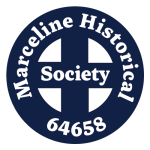William Vogt
Mr. Vogt came to Marceline with the Santa Fe building the telegraph line in 1887 until he was made line repairer at Streator, Illinois and then he transferred back to Marceline September 3, 1888 as line repairer. Miss Louisa Cooper came to Marceline in the spring of 1888 to live with her sister Mrs. Jenett Hurt. Mr. Hurt was the first constable of Marceline. Mr. Vogt and Miss Cooper were married May 12, 1892 and bought property at 103 West Walker Street in 1894 and remained at this location the remainder of their lives.
Hiram Long
Hiram Long was a native of Claremont, New Hampshire and was born May 22, 1827. He was the youngest of fifteen children, and his father, Simeon Long, was a retired sea captain. Mr. Long spent his boyhood days on a farm and pursued the course of study of the common schools. At seventeen years of age, he went to Kinston, New York and spent several years boating on the Hudson River. He got the gold fever in 1849 and spent eight years mining in California, returning to New Hampshire he farmed for twelve years, and then came to Linn County, Missouri and settled on the farm in 1868. This farm he sold to the Edina Company when Marceline was laid out and he then moved to Howe Street. Mr. Long served as Justice of Peace in Bucklin township two years, as a city clerk of Marceline two years and then was elected Justice of Peace. Following this he was elected Mayor of Marceline. Mr. and Mrs. Long were the parents of five children. Mr. Long had brought a melodian with him from the East and a small organ. He would take this little organ to the school houses and give music and singing lessons. He also edited the Marceline papers for several years.
My Grandpa or, The Pioneer’s Call
Whenever I think of my grandparentsI wonder, “Just how did it feelTo leave comforts and loved ones and cherished spotsAnd ride to the end of steel?” And what did they find when they arrived? Only a sprawling space And tents the only abode for awhile In this wild and lonely place. But soon there were houses and barns and sheds And horses and chickens and cows And orchards and gardens and lush green fields On the land turned up by their plows. And, lo, a city is building there Bricks needed by the ton So down by a hill went up Landreth’s kiln And another job was begun. Success seemed to follow his every turn As they garnered the harvest’s hoardAnd always before each feast or snack He offered his thanks to our Lord.Success on the land! But that wasn’t enough No, not for my dear granddadFor he must go into the bowels of earth And see what was there to be had.Oh, many were grateful for this great feat For the coal they mined from the deepWarmed their homes, fired the trains, and ran the plants* And gave many their food and keep.I cherish each hour I spent with him He was never cross or upsetJust went at each task as tho it were new And gave it his very best.I know when they set out that day If some power could have shown them allThat lay ahead, with a hymn and a prayer They would still have answered “The Pioneer’s Call.” *This refers to the electric light plant. There may have been others, but I remember each evening about 4 o’clock they would fire the thing up. (Electricity at first, was only used for lights at night.)


